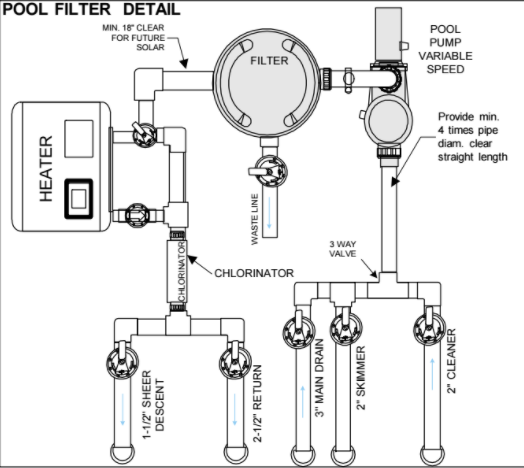|
All swimming pools require physical filtering of pool water. For in-ground pools there are three main types of pool filters for this process, they are sand, Diatomaceous earth (DE), and cartridge filters. Each filter type has its unique advantages. Choosing a filter depends on what the customer is looking for out of their swimming pool or what is important to them.
Sand filters are the oldest and probably the most common type of swimming pool filter. A sand filter tank is filled with about 2/3 pool sand (silica sand). The pump brings water to the top of the sand filter, and the water is dispersed evenly on top of the sand and forced down by pressure through the sand. The sand granules trap debris, silt, and oily deposits between the grains. Although the sand filter does a good enough job filtering unwanted deposits, it can only trap debris as small as 20-40 microns (the least efficient of the three types of filters). Also, a sand filter requires some maintenance. Although the maintenance is not difficult, there are some weekly/monthly and yearly duties. When the sand filter reaches a certain pressure, it is time for backwashing. Backwashing basically runs the pool water in reverse through a designated backwashing pipe to rid of all the collected debris. This process can waste a lot of water from the pool along with any chemical additives that were placed in the pool. Eventually, sand will need to be replaced every 6-8 years. A sand filter will filter your pool to most people’s satisfaction and is typically the least expensive out of the three filter types making the sand filter the best fit for your pocket. A Diatomaceous Earth or DE filter is different in that is uses a different filter media in the form of DE powder. The DE powder is coated on fabric covered grids. When pool water passes through the grids, the DE powder traps particles as small as 3-5 microns making the DE filter the most efficient in filtering. DE filters also require backwashing when filter pressure rises to a point. When backwashing is performed on a DE filter the DE powder is discarded along with the debris. DE powder will need to be replaced into the skimmer after backwashing. Some states require a separation tank to be plumbed into your system for the used DE powder so that the DE does not get into sewers or streams. DE filters are the best in filtering your pool water removing debris 3-5 microns in size, but it is the most expensive, requires the most maintenance, and because the filter has many parts, disassembling the filter for maintenance raises the probability of damaging and replacing parts. With this said if water clarity is the goal DE is the best form of filtration available. Cartridge filters use a pleated polyester type material as its filtering media. Water is forced through the pump to the filter and through the layers/sections of polyester trapping debris 10-15 microns. Filtration for cartridge filters is more efficient than sand filters but cannot filter as well as DE filters. Still 10-15 microns is pretty good and more than likely will not be able to see the difference from DE efficiency. Cartridge filters also do not require backwashing, so it does not require added backwashing valves and ports putting less stress on your system saving you energy. To clean cartridge filters, you simply shut the pump off disassemble the filter, remove the cartridge cylinders and hose the debris off. Having a larger cartridge filter will require less cleaning and maintenance than a smaller filter, so it is sometimes better to go bigger for longer in between cleaning cycles. Most other filters require sizing depending on the pump rating. Cartridge filters are the most environmentally friendly because they cause less stress on your system and do not require water and chemical wasting backwashing. All three filters will filter your pool, but some cost less, filter better, requires less maintenance, or are more environmentally friendly. It really depends on the person and what they want to get out of a filter. I tend to lean more towards cartridge filters but if cost is a factor a sand filter might be best or if you want crystal clear water and don’t mind expense and maintenance than a DE filter might be best. It’s all up to you.
0 Comments
Your comment will be posted after it is approved.
Leave a Reply. |
Archives
September 2020
Pool & Spa |


 RSS Feed
RSS Feed


